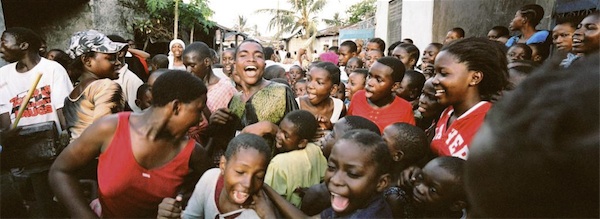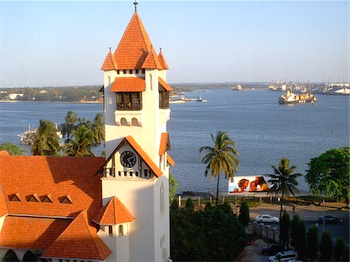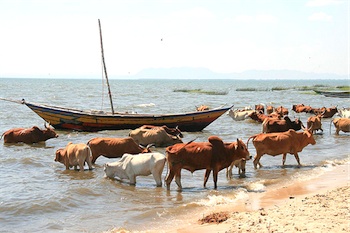My friend Kate Carruthers has decided that we need a Facebook group for Project TOTO. So there it is. You should join, if for no other reason than you’ll be invited to the Stilgherrian’s-going-to-get-killed-so-say-goodbye Party next Saturday 20 June. Probably.
Project TOTO: The Cultural Briefing

One of the most challenging aspects of Project TOTO is that I’ll have to build a rapport with my Tanzanian hosts and colleagues extremely quickly. So yesterday ActionAid Australia gave me a cultural briefing as well as the project briefing.
Here’s what I learned:
- Tanzanians are generally very polite, and will avoid saying anything which they fear might offend. I’ll therefore have to encourage them to open up a bit — especially when blogging for a Western audience.
- Tanzanian society is still quite hierarchical. People respect age and authority. No-one will say they have a bad government or local official, except in very private conversations.
- While the population is split religiously roughly one-third each Muslim, Christian and traditional tribal religions, there’s no major tensions between them.
- Women are “quiet and humble”, especially in rural areas, and when there’s men around they’re unlikely to speak unless asked, or if it’s a one-to-one conversation.
- There’s less physical contact than we’re used to in Australia. No kissing in public! However men and women do shake hands as a greeting.
- Rural people eat a lot of the local green bananas, and plenty of green vegetables, either fried or boiled. My doctor will be happy.
- I should avoid eating meat outside restaurants and the like. However the rural folk might offer a visitor meat and it would be impolite to refuse. What should I do? I must make that decision at the time. Tapeworms FTW!
- My travel doctor was right when she told me to drink only bottled water. The locals will offer soft drinks like Coca-Cola and Fanta, which I will accept and drink.
- The local beer is the Kenyan Tusker Lager and it’s quite acceptable, if a little heavy for the climate. I’ll be asked whether I want it “hot” or “cold”.
- South African wine is available, but relatively expensive. I’ve been advised to avoid the local wine.
- When travelling by 4WD, remember to take toilet paper.
- In the city, Westerners are likely to be perceived according to the usual stereotypes: Americans are loud and religious, Australians are relaxed and joke a lot, Germans are strict and so on. In rural areas we’re all the same: “You’re all white and you’ve got money.”

And apart from that, it’s just the usual stuff when arriving in a new culture: Listen more than you speak, and show respect.
Care to add any other tips?
Phonecasting in WordPress
While chatting with Jeff Waugh, we worked out a great way of blogging from remote Tanzania: podcasting by telephone! Here’s how.
Even if we’re not in one of the 70% of Tanzanian villages with mobile phone coverage, we’ll still have a satellite phone. We call into a voicemail service like mBox and just start talking. It then emails us the MP3 file of the recording.
WordPress already lets you blog by email, checking a standard POP3 mailbox and turning whatever it finds there into a blog post. Email subject becomes post title, email body becomes content. But it doesn’t support attachments. Yet.
Jeff reckons it’d be easy enough to see if the email contains an MP3 file and extract it. It could then be handed to, say, the PodPress plug-in, which in turn makes sure the MP3 file is properly connected to the blog post to work as a podcast. PodPress then automatically updates your podcast listing in iTunes and other directories.
As an added bonus, WordPress can automatically send a message to Twitter when a new episode goes online.
How do we avoid spam? Well, mBox uses Caller ID to make sure the email has a subject like:
mBox Voice message from NNNNNNNNNNN to MMMMMMMMMM
We can check the email headers to ensure they’re legitimately from mBox or whoever we use. And we can use the sender’s phone number to correctly assign the author, and the receiving phone number to, well, post into different categories or whatever.
So, to run through it again… I’m standing on the ferry to Zanzibar. I make a satellite phone call to describe the magnificent view. Five minutes later, that’s a podcast. And everybody gets notified via Twitter.
Of course there’s bound to be some potential for screwing this up, but whaddyareckon?
Project TOTO: The Big Briefing
My plan to blog daily hasn’t gone so well, but yesterday’s briefing session at ActionAid Australia went just fine. My head is exploding with information and possibilities. Here’s the brain dump.
- Assuming everything goes to plan, I’ll arrive in Dar es Salaam, Tanzania, on Saturday 27 June. Two weeks from today. So I leave Sydney in about 12 days, flying (probably) via Perth and South Africa.
- I’ll have most of Saturday to myself to relax and get used to the idea of, you know, being in goddam motherfucking Africa. I’ll also catch up with ActionAid Australia researcher Lena Aahlby, who’s heading over a week before me.
- Sunday 28 June is orientation day with ActionAid Tanzania. “Great, meetings on a Sunday,” I thought. But no. We’re catching the ferry to Zanzibar, like where there’s fabulous tropical beaches, to see for myself that right next to those 5-star resorts there’s the most abject poverty.
- ActionAid Tanzania has chosen two people to be their first official bloggers. They’re based in Dar es Salaam, but travel regularly to all the field projects. One specialises in policy and governance, the other in communications. They can show us the real situation in poor rural areas, sure, but also explain why poverty continues.
- I’ll spend Monday 29 and Tuesday 30 June working with these guys to set up their blogs and introduce them to “social media culture”, for want of a word. We’ll do that in the Dar es Salaam office, where we’ll still have the 1Mb link and access to shops if we’re missing anything.
- For the rest of the week, we’ll travel Tanzania by 4WD and small aircraft, visiting as many field projects as we can fit in. The exact itinerary is still being worked out, but one priority is heading up to the north-west border to Lake Victoria and, oh, Rwanda. I’ve heard of that.
- My plan is that we’ll all post something at least once a day, words and at least one picture. Maybe we can post some video. I’ll be sending a bazillion tweets via my Twitter stream. But we’re also working on something special in the podcasting department, which I’ll tell you about later today.
- Since I’m only in the country a short time, I’ll be trying to connect the bloggers to as many people as possible. We’ve already discovered that ActionAid Denmark (Mellemfolkeligt Samvirke) has one of their people blogging from Dar es Salaam, Pernille Baerndtsen — though of course she brings a European perspective.
So there you have it. Over the next 12 days I’ll be telling you what we’re doing and how you can help and so on. I will try to stick to my planned regime of daily posts.
There will be a going-away party announced soon too because, as Kate Carruthers so delightfully put it, “Let’s face it, you might get killed.” Cheers, Kate.
Oh, and ActionAid Australia also gave me a cultural briefing on Tanzania.
[Photos: Lutheran church in Dar es Salaam by Greenery; Lake Victoria, Tanzania, by Marc Veraart. Both used under a Creative Commons license.]
A Series of Tubes returned weeks ago
I’ve been very slack about keeping you up to date with the podcast A Series of Tubes, on which I’m a regular guest with the redoubtable Richard Chirgwin. So, here we go…
In episode 83 (24 May) I spoke about about my Project TOTO trip to Tanzania.
In episode 84 (31 May), it says “Stilgherrian is trying to get ready for Project TOTO in Tanzania, in spite of the tribulations of topless garden gnomes (Tubes doesn’t know either!), but still took time to talk censorship, international cables, the OECD and Sol’s parting shot.”
And in episode 85 (10 June), I spoke about regulation, censorship, and Google Wave.
Richard and I recorded another interview yesterday, so I’m guessing episode 86 will appear tomorrow some time.
NBN: Of course there are no applications yet!
The guy in the photo is Jerry Watkins, Senior Lecturer in the Faculty of Design at Swinburne University of Technology in Melbourne — and I want to slap him.
This morning he was a guest on ABC Radio National’s FutureTense, where he talked about some fantastic third-world technology projects, like India’s DakNet.
A Wi-Fi transmitter and receiver is fitted to the local bus. So the bus drives along its normal route, goes through a number of villages, and what it’s doing while it’s stopping at the bus stop in each village, is simply picking up and delivering information via Wi-Fi from publicly-accessible computers in each village… Once it gets back into town, it simply uploads all its stored data onto the Internet… So in this way, the rural community is getting access to a very affordable internet connection, it’s just simply not always on…
It’s services like e-shopping which are proving increasingly popular with these users. So e-shopping is using the bus internet system, and it allows villagers to order essential items and luxury items, which just aren’t available at the village market. And what’s more, the items are often delivered to the village on the very same bus with the Wi-Fi transmitter.
Awesome. But that’s not why I want to slap him.
I want to slap Jerry Watkins because he said daft things about Australia’s proposed National Broadband Network.
Continue reading “NBN: Of course there are no applications yet!”




